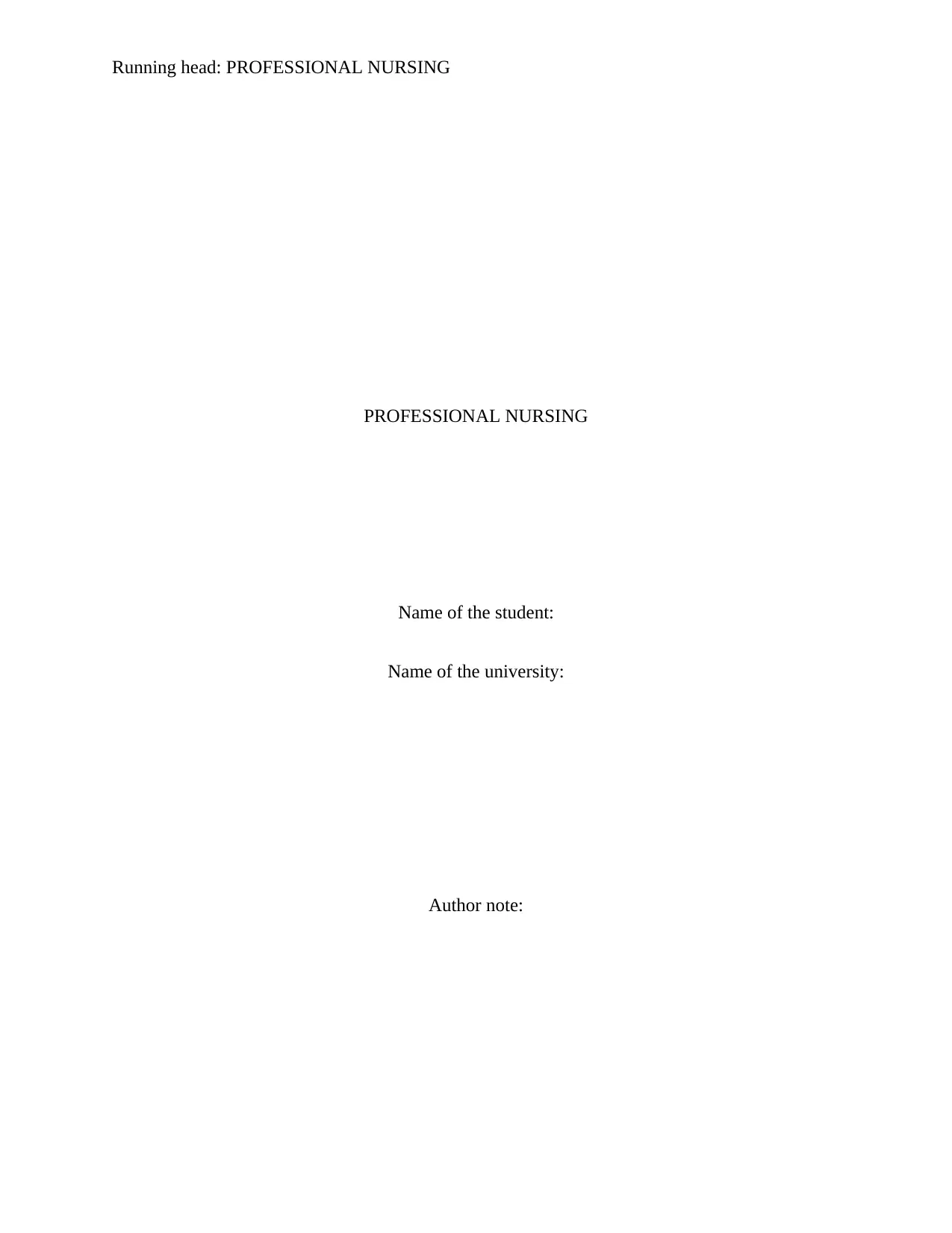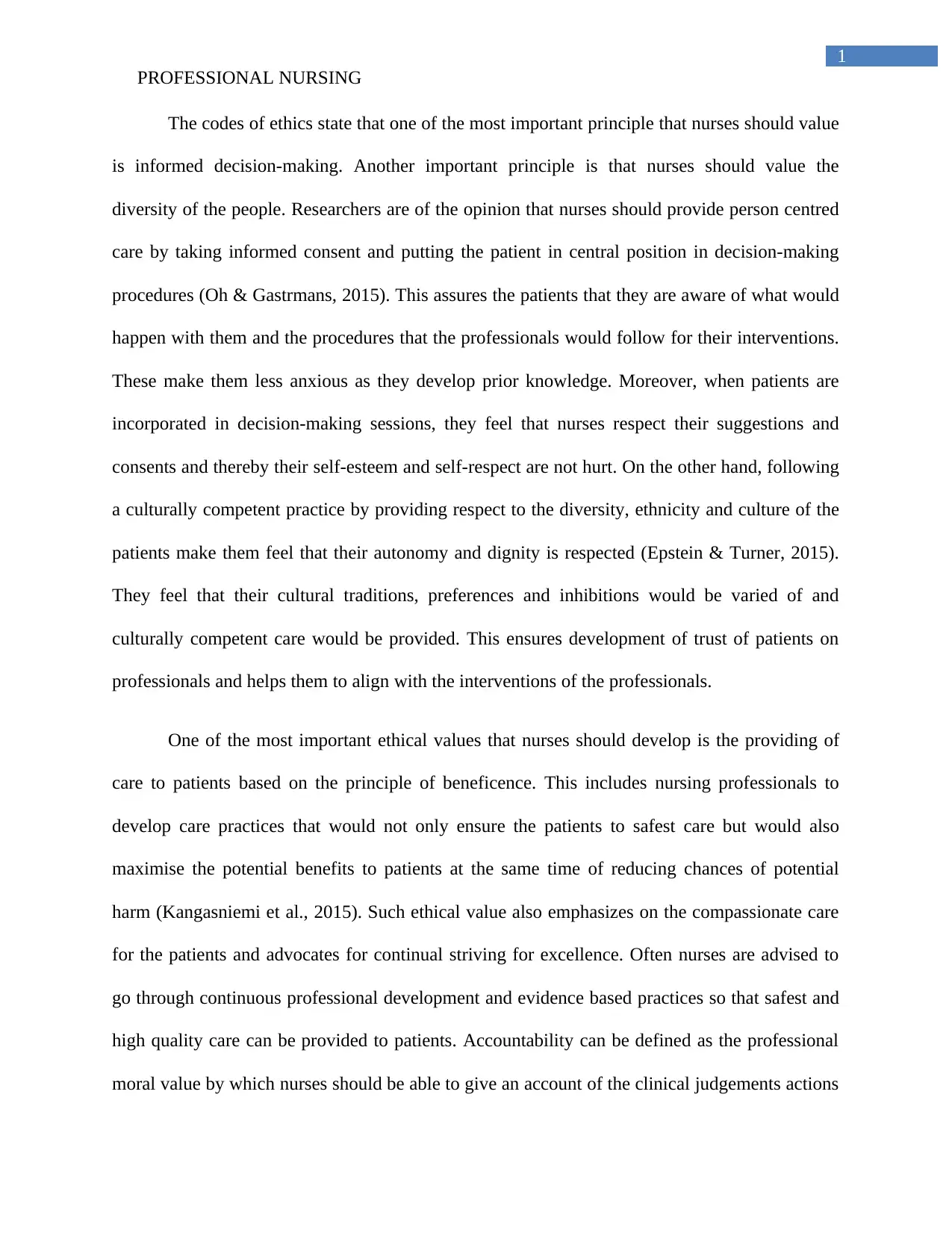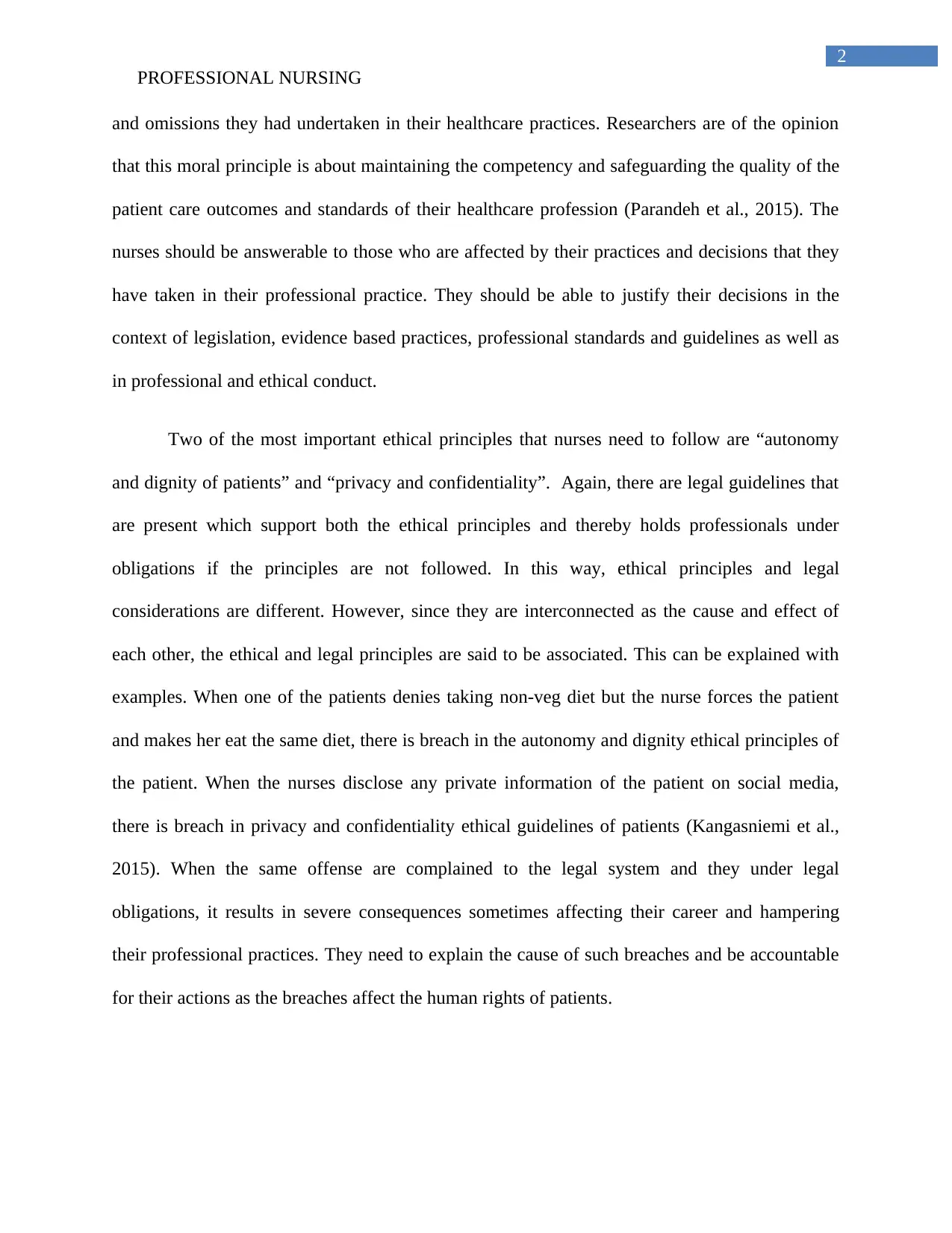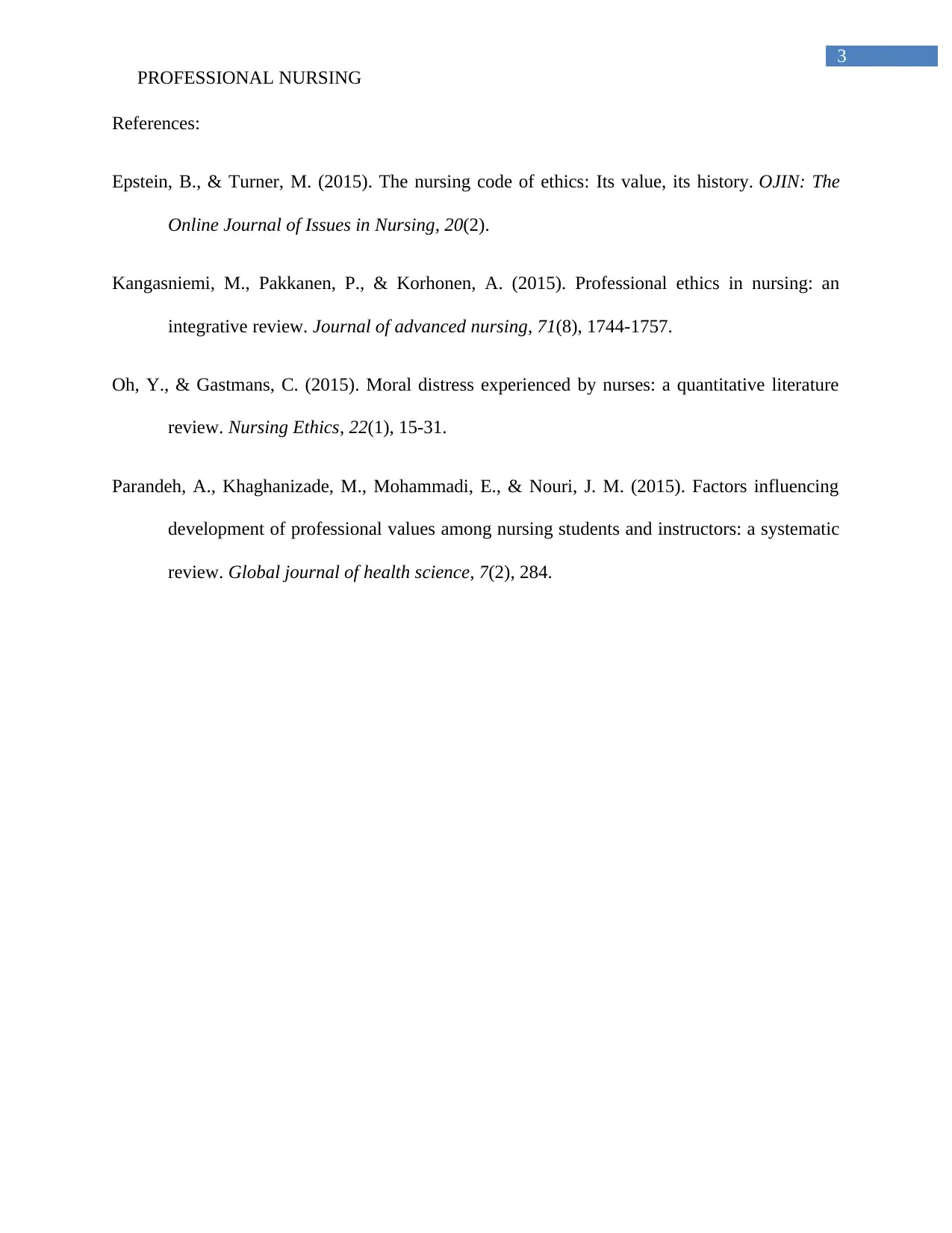Analysis of Ethics, Values, and Legal Conduct in Professional Nursing
VerifiedAdded on 2023/06/12
|4
|878
|429
Essay
AI Summary
This essay delves into the critical aspects of professional nursing, emphasizing the importance of informed decision-making, respecting patient diversity, and providing person-centered care. It highlights the ethical principles of beneficence, accountability, autonomy, and the preservation of patient dignity, alongside the legal considerations that underpin these principles. The paper underscores the interconnectedness of ethical and legal guidelines, illustrating how breaches in ethical conduct can lead to legal repercussions, thereby affecting a nurse's career and professional practice. By adhering to these ethical and legal standards, nurses can ensure the delivery of safe, high-quality care while upholding patient rights and fostering trust within the healthcare environment. The document uses examples to explain the importance of ethics and legal considerations in nursing.

Running head: PROFESSIONAL NURSING
PROFESSIONAL NURSING
Name of the student:
Name of the university:
Author note:
PROFESSIONAL NURSING
Name of the student:
Name of the university:
Author note:
Paraphrase This Document
Need a fresh take? Get an instant paraphrase of this document with our AI Paraphraser

1
PROFESSIONAL NURSING
The codes of ethics state that one of the most important principle that nurses should value
is informed decision-making. Another important principle is that nurses should value the
diversity of the people. Researchers are of the opinion that nurses should provide person centred
care by taking informed consent and putting the patient in central position in decision-making
procedures (Oh & Gastrmans, 2015). This assures the patients that they are aware of what would
happen with them and the procedures that the professionals would follow for their interventions.
These make them less anxious as they develop prior knowledge. Moreover, when patients are
incorporated in decision-making sessions, they feel that nurses respect their suggestions and
consents and thereby their self-esteem and self-respect are not hurt. On the other hand, following
a culturally competent practice by providing respect to the diversity, ethnicity and culture of the
patients make them feel that their autonomy and dignity is respected (Epstein & Turner, 2015).
They feel that their cultural traditions, preferences and inhibitions would be varied of and
culturally competent care would be provided. This ensures development of trust of patients on
professionals and helps them to align with the interventions of the professionals.
One of the most important ethical values that nurses should develop is the providing of
care to patients based on the principle of beneficence. This includes nursing professionals to
develop care practices that would not only ensure the patients to safest care but would also
maximise the potential benefits to patients at the same time of reducing chances of potential
harm (Kangasniemi et al., 2015). Such ethical value also emphasizes on the compassionate care
for the patients and advocates for continual striving for excellence. Often nurses are advised to
go through continuous professional development and evidence based practices so that safest and
high quality care can be provided to patients. Accountability can be defined as the professional
moral value by which nurses should be able to give an account of the clinical judgements actions
PROFESSIONAL NURSING
The codes of ethics state that one of the most important principle that nurses should value
is informed decision-making. Another important principle is that nurses should value the
diversity of the people. Researchers are of the opinion that nurses should provide person centred
care by taking informed consent and putting the patient in central position in decision-making
procedures (Oh & Gastrmans, 2015). This assures the patients that they are aware of what would
happen with them and the procedures that the professionals would follow for their interventions.
These make them less anxious as they develop prior knowledge. Moreover, when patients are
incorporated in decision-making sessions, they feel that nurses respect their suggestions and
consents and thereby their self-esteem and self-respect are not hurt. On the other hand, following
a culturally competent practice by providing respect to the diversity, ethnicity and culture of the
patients make them feel that their autonomy and dignity is respected (Epstein & Turner, 2015).
They feel that their cultural traditions, preferences and inhibitions would be varied of and
culturally competent care would be provided. This ensures development of trust of patients on
professionals and helps them to align with the interventions of the professionals.
One of the most important ethical values that nurses should develop is the providing of
care to patients based on the principle of beneficence. This includes nursing professionals to
develop care practices that would not only ensure the patients to safest care but would also
maximise the potential benefits to patients at the same time of reducing chances of potential
harm (Kangasniemi et al., 2015). Such ethical value also emphasizes on the compassionate care
for the patients and advocates for continual striving for excellence. Often nurses are advised to
go through continuous professional development and evidence based practices so that safest and
high quality care can be provided to patients. Accountability can be defined as the professional
moral value by which nurses should be able to give an account of the clinical judgements actions

2
PROFESSIONAL NURSING
and omissions they had undertaken in their healthcare practices. Researchers are of the opinion
that this moral principle is about maintaining the competency and safeguarding the quality of the
patient care outcomes and standards of their healthcare profession (Parandeh et al., 2015). The
nurses should be answerable to those who are affected by their practices and decisions that they
have taken in their professional practice. They should be able to justify their decisions in the
context of legislation, evidence based practices, professional standards and guidelines as well as
in professional and ethical conduct.
Two of the most important ethical principles that nurses need to follow are “autonomy
and dignity of patients” and “privacy and confidentiality”. Again, there are legal guidelines that
are present which support both the ethical principles and thereby holds professionals under
obligations if the principles are not followed. In this way, ethical principles and legal
considerations are different. However, since they are interconnected as the cause and effect of
each other, the ethical and legal principles are said to be associated. This can be explained with
examples. When one of the patients denies taking non-veg diet but the nurse forces the patient
and makes her eat the same diet, there is breach in the autonomy and dignity ethical principles of
the patient. When the nurses disclose any private information of the patient on social media,
there is breach in privacy and confidentiality ethical guidelines of patients (Kangasniemi et al.,
2015). When the same offense are complained to the legal system and they under legal
obligations, it results in severe consequences sometimes affecting their career and hampering
their professional practices. They need to explain the cause of such breaches and be accountable
for their actions as the breaches affect the human rights of patients.
PROFESSIONAL NURSING
and omissions they had undertaken in their healthcare practices. Researchers are of the opinion
that this moral principle is about maintaining the competency and safeguarding the quality of the
patient care outcomes and standards of their healthcare profession (Parandeh et al., 2015). The
nurses should be answerable to those who are affected by their practices and decisions that they
have taken in their professional practice. They should be able to justify their decisions in the
context of legislation, evidence based practices, professional standards and guidelines as well as
in professional and ethical conduct.
Two of the most important ethical principles that nurses need to follow are “autonomy
and dignity of patients” and “privacy and confidentiality”. Again, there are legal guidelines that
are present which support both the ethical principles and thereby holds professionals under
obligations if the principles are not followed. In this way, ethical principles and legal
considerations are different. However, since they are interconnected as the cause and effect of
each other, the ethical and legal principles are said to be associated. This can be explained with
examples. When one of the patients denies taking non-veg diet but the nurse forces the patient
and makes her eat the same diet, there is breach in the autonomy and dignity ethical principles of
the patient. When the nurses disclose any private information of the patient on social media,
there is breach in privacy and confidentiality ethical guidelines of patients (Kangasniemi et al.,
2015). When the same offense are complained to the legal system and they under legal
obligations, it results in severe consequences sometimes affecting their career and hampering
their professional practices. They need to explain the cause of such breaches and be accountable
for their actions as the breaches affect the human rights of patients.
⊘ This is a preview!⊘
Do you want full access?
Subscribe today to unlock all pages.

Trusted by 1+ million students worldwide

3
PROFESSIONAL NURSING
References:
Epstein, B., & Turner, M. (2015). The nursing code of ethics: Its value, its history. OJIN: The
Online Journal of Issues in Nursing, 20(2).
Kangasniemi, M., Pakkanen, P., & Korhonen, A. (2015). Professional ethics in nursing: an
integrative review. Journal of advanced nursing, 71(8), 1744-1757.
Oh, Y., & Gastmans, C. (2015). Moral distress experienced by nurses: a quantitative literature
review. Nursing Ethics, 22(1), 15-31.
Parandeh, A., Khaghanizade, M., Mohammadi, E., & Nouri, J. M. (2015). Factors influencing
development of professional values among nursing students and instructors: a systematic
review. Global journal of health science, 7(2), 284.
PROFESSIONAL NURSING
References:
Epstein, B., & Turner, M. (2015). The nursing code of ethics: Its value, its history. OJIN: The
Online Journal of Issues in Nursing, 20(2).
Kangasniemi, M., Pakkanen, P., & Korhonen, A. (2015). Professional ethics in nursing: an
integrative review. Journal of advanced nursing, 71(8), 1744-1757.
Oh, Y., & Gastmans, C. (2015). Moral distress experienced by nurses: a quantitative literature
review. Nursing Ethics, 22(1), 15-31.
Parandeh, A., Khaghanizade, M., Mohammadi, E., & Nouri, J. M. (2015). Factors influencing
development of professional values among nursing students and instructors: a systematic
review. Global journal of health science, 7(2), 284.
1 out of 4
Related Documents
Your All-in-One AI-Powered Toolkit for Academic Success.
+13062052269
info@desklib.com
Available 24*7 on WhatsApp / Email
![[object Object]](/_next/static/media/star-bottom.7253800d.svg)
Unlock your academic potential
Copyright © 2020–2026 A2Z Services. All Rights Reserved. Developed and managed by ZUCOL.





